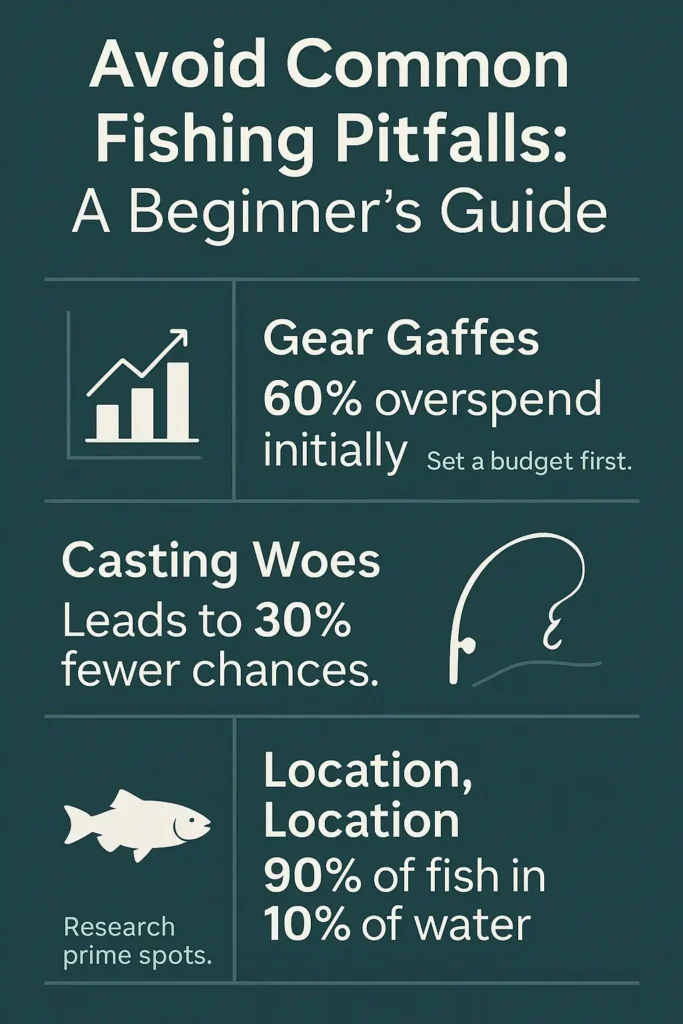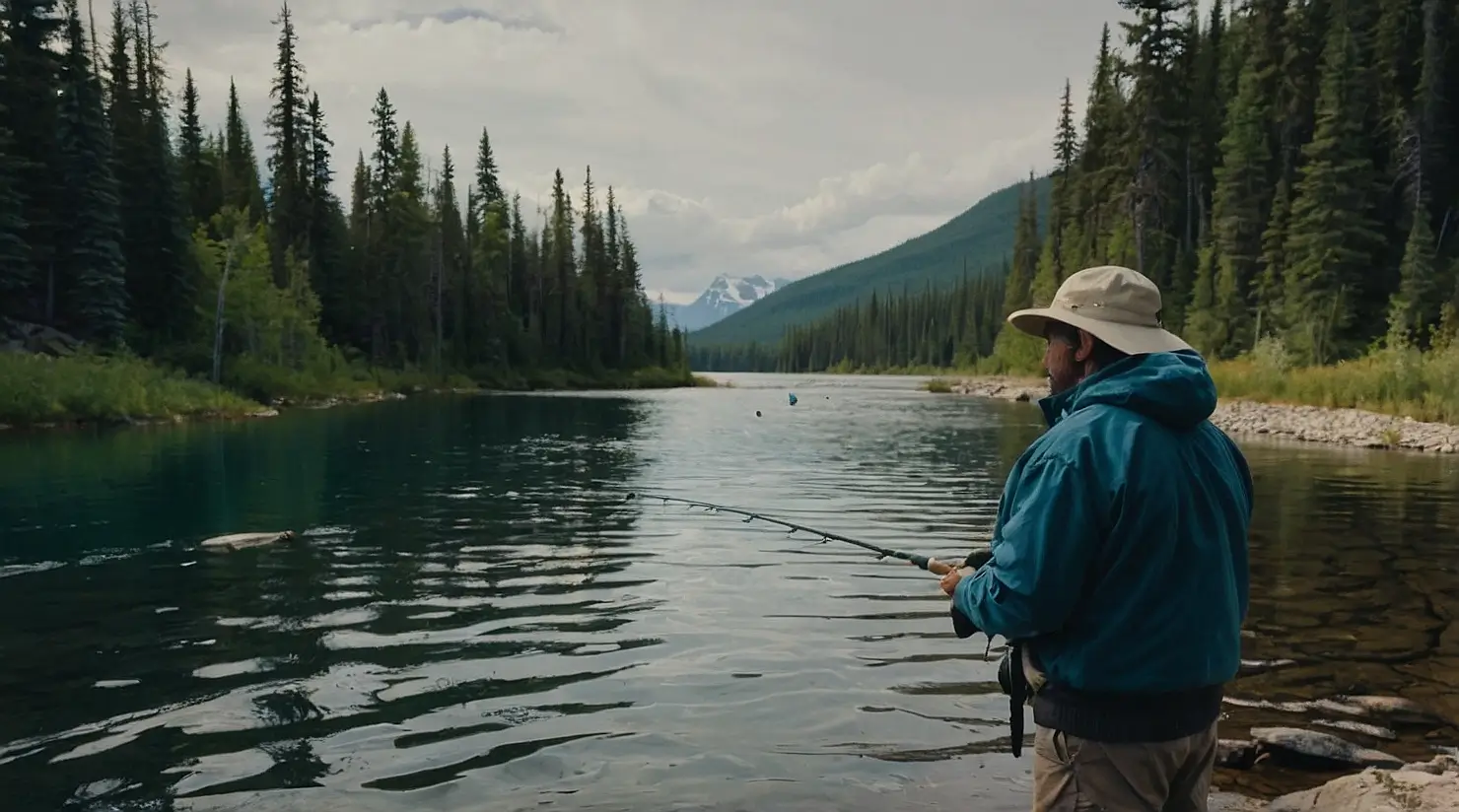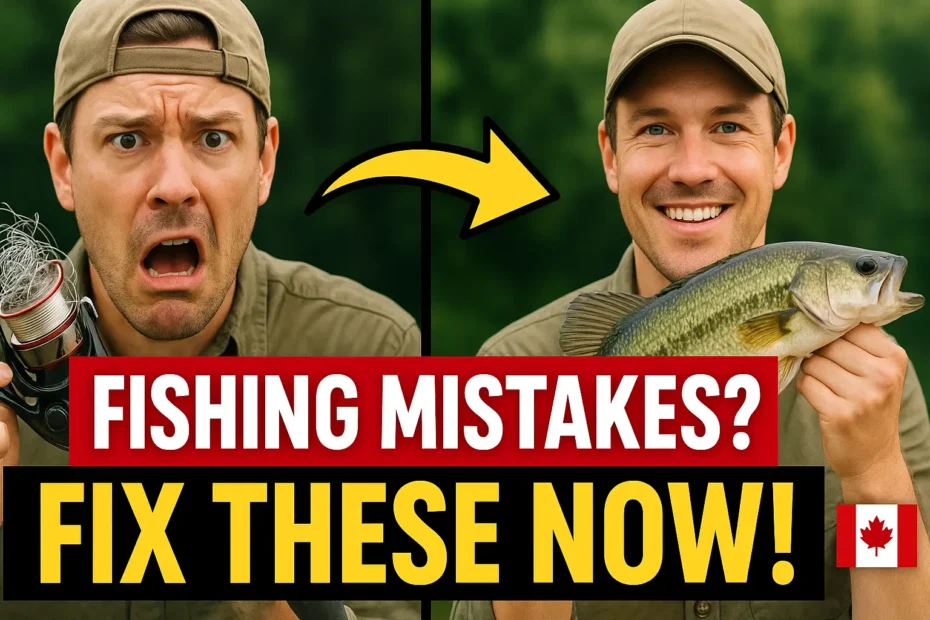New fishers often make simple errors like buying costly gear too soon or using wrong casting methods. Knowing these common fishing mistakes helps you learn faster and enjoy fishing more.
Common Beginner Mistakes — Fishing (and how to fix them)
Quick picks
Top‑10 beginner mistakes (and quick fixes)
- Not re‑tying knots: After a snag/fish, re‑tie. Frayed line = lost fish.
- Wrong drag: Drag locked or too loose. Set to ~25–30% of line strength and test pull.
- Dull hooks: If it won’t scratch a thumbnail, sharpen or swap.
- Fishing too fast: Most lures work slower than you think. Pause, bump cover, change cadence.
- Ignoring structure: Fish edges: weedlines, points, docks, current seams.
- Line mismatch: Ultra‑light line in cover or cable‑thick in clear water. Match to conditions.
- Bad casting angles: Cast up‑current/wind and work through the strike zone.
- Never changing: No bites? Change depth, speed, profile—in that order.
- Over‑lighting at night: White light on the water spooks fish. Use red/dim, look away.
- Skipping regs/safety: Check local regulations, seasons, barbless rules; wear a PFD.
Tip: Control the controllables—knot, drag, hook, angle, speed, depth.
Estimated reading time: 5 minutes
Want to enjoy fishing without early frustrations? Many new fishers make similar slip-ups. Learning about these common mistakes beginners make in fishing helps you learn faster. You can have more fun by the water.
- Learn One Knot: Master one or two basic fishing knots. No need for many complex ones at first. Many find that a few good knots are enough.
- Ask Locals: Talk to anglers at local bait shops. They know what works in your area. This can help you choose the right lures or flies.
- Practice Casting: Spend time practicing your cast in an open area. Good casting means fewer tangles.
- Be Patient: Fishing takes time. Enjoy being outdoors. Do not expect to catch a fish every cast.
Mistakes with Your Fishing Gear
Getting the right gear is important. But beginners often make a few key errors.

Buying Too Much Fancy Gear
Many new anglers think expensive gear means more fish. This is not always true. Mid-level gear is usually fine when you start. It lets you learn without spending too much. You can always get better essential fishing gear for beginners as you get more skilled. Some advice suggests that focusing on skill first is better than buying high-end equipment.
Using Gear That’s Too Strong
Heavy or powerful gear can scare fish. Try to use medium power rods. These rods should also have moderate action. This means they are not too stiff. Using lighter gear can sometimes help you get more bites.
Complicating Fishing Knots
There are many fishing knots. Some are very complex. Beginners should keep it simple. Focus on learning a few basic, strong knots well. You do not need to know dozens of knots to start fishing.
Errors in How You Fish
Your actions by the water matter a lot. Small changes can make a big difference.
Not Casting Well
Casting is how you get your line and bait into the water. Poor casting leads to tangled lines. You might also lose your bait. Practice helps a lot. You can watch videos or even take a short lesson to improve your beginner fishing techniques. Learning proper casting is a key skill.
Bad Line Management
Your fishing line needs care. If you do not check it, it can get twisted or weak. This can cause you to lose a fish. Check your line often for any problems. Make sure it winds onto your reel smoothly.
Setting the Hook Too Hard
When a fish bites, you need to “set the hook.” This means a quick pull to fix the hook in the fish’s mouth. Some beginners pull way too hard. This can hurt the fish. It can also break your line or pull the hook out. A firm, steady pull is usually enough.
Not Being Thorough
Sometimes fish hide near things like docks or fallen trees. Beginners might only cast to one or two spots near these structures. It is better to be thorough. Try casting from different angles around the structure. This gives you a better chance to find where fish are hiding.
Common Mistakes Beginners Make in Fishing: Understanding Fish and Water
Knowing about fish and their homes is a big part of fishing.
Picking the Wrong Lures or Flies
Lures and flies are types of bait that attract fish. There are many kinds. Beginners often pick them without much thought. It is important to choose lures that local fish like. Think about what fish in your area eat. Talking to experienced fishers at a local tackle shop can help.
Not Knowing Where Fish Are
Fish are not spread out evenly in the water. Most fish (about 90%) are often found in small areas (about 10% of the water). This is called the 90/10 rule. Beginners may not know how to find these good spots. Learning to “read” the water helps.
Look for places where fish might find food or shelter. This could be near drop-offs, weeds, or where currents meet. Learning about the best fishing spots for beginners in Canada can also give you a head start.
Scaring the Fish
Fish can be easily scared. Loud noises or sudden movements can make them swim away. When you get near a fishing spot, move slowly and quietly. Try not to cast a big shadow over the water where you want to fish.
Poor Positioning
Where you stand or sit to fish is important. If fish see you, they might get spooked before you even cast. Think about how the fish see their world. Approach the water carefully.
Having Unrealistic Ideas
Sometimes, TV shows or online videos make fishing look very easy. They might only show the exciting parts. Beginners can get wrong ideas. They might expect to catch many big fish right away. Fishing takes patience and learning. It is okay if you do not catch anything on some days. Enjoy the process of learning.
My Early Fishing Goof: A Quick Lesson About Common Mistakes Beginners Make in Fishing
I remember my first time trying to fly fish. I bought a very expensive rod. I thought it would make me catch lots of fish. Instead, I spent most of my time untangling my line!
Starting simple would have saved me trouble and money. Learning the basics first really is the best way. You should also consider some fishing safety tips for beginners before you head out.
Conclusion
Fishing is a great hobby. New anglers can avoid many common problems with a little knowledge. If you learn from these common fishing mistakes, your fishing trips will be more fun. You will also get better at catching fish.
Quick Fixes for Fishing Mistakes
Your Questions About Beginner Fishing Mistakes Answered (Simply)
What is the most common mistake in fishing for beginners?
Why do beginners struggle with fishing?
How can I improve my fishing skills as a beginner?
What gear do I really need to start fishing?
Is fishing hard for beginners?
How do I not scare fish away?
What’s a simple fishing knot for beginners?




